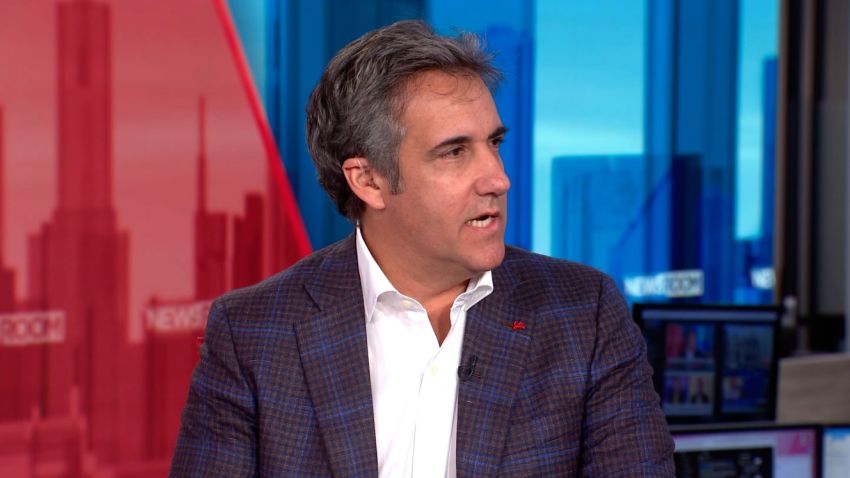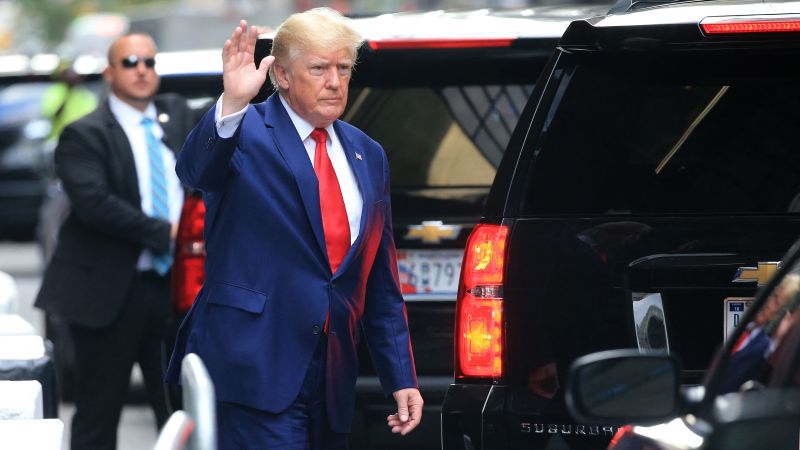CNN
—
Days before then-President Donald Trump left the White House, federal prosecutors in New York discussed whether to potentially charge Trump with campaign finance crimes once he was out of office, according to a new book from CNN senior legal analyst Elie Honig.
Prosecutors from the Southern District of New York developed significant evidence against Trump when they charged his former attorney Michael Cohen in 2018 over a hush money scheme paying two women claiming affairs with Trump, including adult film star Stormy Daniels, Honig writes. But prosecutors did not consider charging Trump at the time because of longstanding Justice Department guidance that a sitting president cannot be indicted.
With Trump about to leave office in January 2021, however, Audrey Strauss, the acting US attorney, held multiple discussions with a small group of prosecutors to discuss its evidence against Trump. They decided to not seek an indictment of Trump for several reasons, Honig writes, including the political ramifications and the fact that Trump’s other scandals, such as efforts to overturn the 2020 presidential election and the January 6, 2021, insurrection, “made the campaign finance violations seem somehow trivial and outdated by comparison.”
“We were well aware of the prudential reasons why you wouldn’t charge a president, even after he was out of office,” one person with knowledge of the investigation told Honig.
Honig’s book, “Untouchable,” explores how Trump and other powerful people “get away with it,” focusing both on the former president as well as some of the mob bosses Honig took on when he was an assistant US attorney in New York from 2004-2012 and a state prosecutor in New Jersey. The book was obtained by CNN ahead of its January 31 release date.
While federal prosecutors in New York opted not to pursue their case against Trump, Manhattan District Attorney Alvin Bragg appears to be looking into the matter again. Cohen met this month with prosecutors from his office, the first such meeting in more than a year and the clearest sign to date that the Manhattan district attorney is zeroing in on the Trump Organization’s involvement in the hush-money payments.
Honig writes that his account of the 2018 Cohen indictment is based on interviews with more than a half-dozen people directly involved in the federal prosecution of Cohen.
Prosecutors from the Southern District of New York had prepared a draft indictment of Cohen that included “exhaustive detail of Trump’s central involvement in the hush money scheme,” according to Honig.
“The draft Cohen indictment was a full accounting, running over fifty pages in one iteration – essentially both a formal indictment of Cohen and a public excoriation of Trump, only without charges attached,” Honig writes. “The SDNY’s draft indictment left no doubt: Trump wasn’t merely a bystander or an unwitting beneficiary of the campaign finance crime. He was the driving force behind the scheme, and likely criminally liable for it.”
But nearly all of the details about Trump were scrubbed from the indictment by Justice Department leaders.
Trump was eventually referenced with minimal detail in the final court filing supporting the charges against Cohen as “Individual-1,” because he was not charged with a crime.
Prosecutors gave “serious internal considerations” to a stronger label, Honig writes, including what he called the “nuclear option” of describing Trump as “Co-conspirator 1.”
But prosecutors in New York opted against seeking to label Trump as “co-conspirator 1,” and instead their initial version called Trump “Candidate-1.” The Justice Department, however, preferred “a bit more circumspection,” according to Honig, and they landed on “Individual-1.”
Cohen admitted to paying $130,000 to Daniels to stop her from going public about an alleged affair with Trump just before the 2016 election. He also helped arrange a $150,000 payment from the publisher of the National Enquirer to Karen McDougal to kill her story claiming a 10-month affair with Trump. Trump has denied both affairs.
Honig writes that when the draft indictment detailing Trump’s conduct was sent to Justice Department headquarters in Washington, it was rejected by Ed O’Callaghan, DOJ’s principal deputy associate attorney general.
“In DOJ’s view, the Trump-specific language was superfluous and threatened to harm the reputation of an unindicted party,” Honig writes. “It would be unfair to Trump, and potentially damaging more broadly to the country, to effectively accuse the sitting president of a crime without affording him a formal mechanism to defend himself.”
Rob Khuzami, the deputy US attorney in New York, pushed back, arguing that the Justice Department “could not and should not hide vital information from the public about the sitting president’s role in a federal felony,” Honig writes.

Michael Cohen and Elie Honig weigh in on ex-Trump Org CFO’s guilty plea
But after a series of “heated but substantive” discussions, the Justice Department leaders held firm and the New York prosecutors acceded, removing details about Trump from the Cohen indictment.
In August 2018, Cohen pleaded guilty to eight criminal counts and implicated Trump while in court, admitting that, “in coordination and at the direction of a candidate for federal office,” he kept information from becoming public that would have harmed Trump during the 2016 campaign.
Geoffrey Berman – who was US Attorney in the Southern District from 2018-2020, though he was recused in the Cohen case – wrote in his book “Holding the Line” last year that DOJ forced a re-write of the Cohen filing to remove certain allegations, including “that Individual-1 acted ‘in concert with’ and ‘coordinated with’ Cohen on the illegal campaign contributions” – though Berman noted that Cohen himself connected the allegations to Trump when testifying in court.
Still, in interviews last September surrounding the book’s release, Berman suggested that prosecutors did not have the evidence to bring a successful case against Trump.
“When it comes to indicting, you have to look at the admissible evidence against a particular individual. And so we looked at the evidence against Michael Cohen and it was there and he pled guilty and, you know, no other prosecutions were brought because, you know, there wasn’t a case to be brought,” Berman said on a podcast with Jon Stewart.
The disputes Honig describes over the Cohen case between Justice Department officials in Washington and the prosecutors at the Southern District of New York – famous for its independent streak among US attorneys – is one of several instances where the New York office clashed with the Trump DOJ.
In 2020, then-Attorney General William Barr fired Berman. Barr didn’t give a reason for Berman’s firing beyond saying it was a Trump’s request, and it happened while Berman’s office was in the midst of an investigation into Trump’s personal attorney Rudy Giuliani.
The investigation into Cohen was handed off to prosecutors in New York from former special counsel Robert Mueller because it did not deal directly with Russian interference in the 2016 election.
The prosecutors knew there was standing Justice Department guidance that a sitting president could not be indicted, but they did their own research to “make sure the Justice Department got it right,” Honig writes. The team in New York came to the same conclusion, also determining that they could not indict a president “under seal” until leaving office.
One prosecutor said, “We wouldn’t even bat an eye about charging Trump, if it was somebody who was less known,” Honig writes. Others were less confident. Some felt there was more than enough to charge, while others thought while there was substantial evidence, it was a bit close to the line for such a high-stakes case.
Prosecutors considered trying to bolster their case against Cohen and considered briefly the possibility of pursuing a wiretap of Trump’s advisers, according to Honig. They discussed internally whether they should show probable cause relating to any Trump advisers’ phones.
“The team understood that such a wiretap might yield evidence of conversations involving Trump himself,” according to the book. “If granted, the wiretap would have been a historic first. No sitting president, or former president, has ever been captured speaking on a court-ordered wiretap.”
Strauss, who at the time was executive US attorney for the southern district, quickly rebuffed the proposed wiretap, according to Honig, cognizant that a wiretap might capture conversations of a sitting president.
Before Cohen was indicted, SDNY prosecutors met with a Trump attorney, Joanna Hendon, who made a case that Cohen’s indictment should not involve Trump, Honig writes. Khuzami assured Hendon his office agreed it could not indict a sitting president. Hendon also argued against labeling Trump in any documents as a co-conspirator because he could not be indicted and would therefore have no forum available to defend himself and clear his name.
It was the same rationale DOJ leaders would later use to strip details about Trump’s involvement from the Cohen indictment, which Honig notes gave Trump double protection from being implicated: “We can’t indict him because he’s president, and we can’t name him as a co-conspirator because we can’t indict him.”

